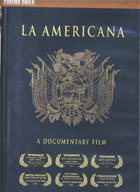
La Americana 2010
Distributed by Cinema Guild, 115 West 30th Street, Suite 800, New York, NY 10001; 212-685-6242
Produced by Nicholas Bruckman
Directed by Nicholas Bruckman
DVD, color, 54 min.
High School - General Adult
Immigration, Politics, Parenting, Labor
Date Entered: 03/23/2017
Reviewed by Rob Bohall, George Fox UniversityThis moving human interest documentary chronicles the journey of Maria, a poor single mother from Bolivia who reluctantly left her paralyzed daughter six years prior to earn enough money in the United States for her medical expenses.
Maria struggles to survive in New York, working menial jobs while coping with the formidable emotional, financial and legal challenges of being an illegal immigrant with extremely limited support. Disillusioned by the false promise of success in a country that simultaneously needs and rejects her, she eventually returns to the crushing poverty of Bolivia and is reunited with her daughter.
The film does well to humanize the politically contentious U.S. immigration debate through Maria’s story, presenting her as a compelling protagonist caught up in a no-win situation. The viewer sees her as a kind, courageous woman of integrity facing incredible personal and systemic challenges.
Students will be challenged to think critically and reflect on:
- whether Maria (and other undocumented immigrants to the U.S.) is right to enter the U.S. illegally
- the meaning of the “American Dream” today
- what it means to be an American, and who that includes
- their attitude toward undocumented immigrants and citizens of developing countries
Bolivian folk music throughout the film serves to remind the viewer that Maria’s heart lies many miles away with the daughter whom she desperately misses. The footage is at times a bit grainy, but this adds an air of authenticity and doesn’t detract. With even pacing and good editing, overall this is a solid work with an optimistic and inspiring heart.
Recommended for use in high school and undergraduate college courses, especially in Latin American studies, sociology, economics, ethics and politics.